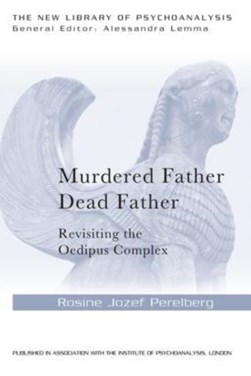-
BROWSE 1000s OF BOOKS IN STOCK
-
FREE DELIVERY ON ORDERS OVER €10
Murdered father, dead father
PAPERBACK
Series: See all books in this series
Murdered Father, Dead Father: Revisiting the Oedipus Complex examines the progressive construction of the notion of paternal function and its central relevance in psychoanalysis. The distinction between the murdered (narcissistic) father and the dead father is seen as providing a paradigm for the understanding of different types of psychopathologies, as well as works of literature, anthropology and historical events. New concepts are introduced, such as "a father is being beaten ", and a distinction between the descriptive après coup and the dynamic après coup that provides a model for a psychoanalytic understanding of temporality. The book includes a reflection on how the concepts of the death instinct and the negative , in their connection with that which is at the limits of representability, are an aid to an understanding of Auschwitz, a moment of rupture in European culture that the author characterizes as " the murder of the dead father". Perelberg's book is an important clinical and intellectual marker, and will be required reading for psychoanalysts, psychotherapists, anthropologists, and historians, as well as students in all these disciplines.
€62.34

187 Reward Points
In stock online
Extended Range: Delivery in 2-3 working days
Extended Range: Delivery in 2-3 working days
Free Delivery on this item
Any purchases for more than €10 are eligible for free delivery anywhere in the UK or Ireland!
Murdered Father, Dead Father: Revisiting the Oedipus Complex examines the progressive construction of the notion of paternal function and its central relevance in psychoanalysis. The distinction between the murdered (narcissistic) father and the dead father is seen as providing a paradigm for the understanding of different types of psychopathologies, as well as works of literature, anthropology and historical events. New concepts are introduced, such as "a father is being beaten ", and a distinction between the descriptive après coup and the dynamic après coup that provides a model for a psychoanalytic understanding of temporality. The book includes a reflection on how the concepts of the death instinct and the negative , in their connection with that which is at the limits of representability, are an aid to an understanding of Auschwitz, a moment of rupture in European culture that the author characterizes as " the murder of the dead father". Perelberg's book is an important clinical and intellectual marker, and will be required reading for psychoanalysts, psychotherapists, anthropologists, and historians, as well as students in all these disciplines.

187 Reward Points
Any purchases for more than €10 are eligible for free delivery anywhere in the UK or Ireland!
€62.34

187 Reward Points
Any purchases for more than €10 are eligible for free delivery anywhere in the UK or Ireland!
Series: See all books in this series
Product Description
Murdered Father, Dead Father: Revisiting the Oedipus Complex examines the progressive construction of the notion of paternal function and its central relevance in psychoanalysis. The distinction between the murdered (narcissistic) father and the dead father is seen as providing a paradigm for the understanding of different types of psychopathologies, as well as works of literature, anthropology and historical events. New concepts are introduced, such as "a father is being beaten ", and a distinction between the descriptive après coup and the dynamic après coup that provides a model for a psychoanalytic understanding of temporality. The book includes a reflection on how the concepts of the death instinct and the negative , in their connection with that which is at the limits of representability, are an aid to an understanding of Auschwitz, a moment of rupture in European culture that the author characterizes as " the murder of the dead father". Perelberg's book is an important clinical and intellectual marker, and will be required reading for psychoanalysts, psychotherapists, anthropologists, and historians, as well as students in all these disciplines.
Product Details
ISBN9781138841840
FormatPAPERBACK
PublisherROUTLEDGE (05 November. 2015)
No. of Pages0
Weight406
Language English
Dimensions 234 x 156 x 15

